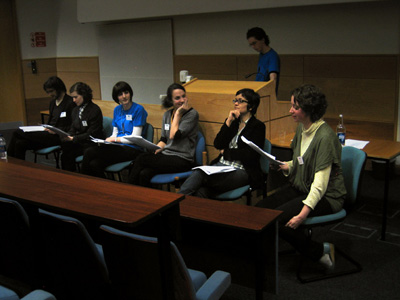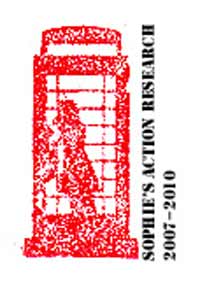
image: performing the script that forms part of my theory chapter, with volunteers from the audience at the AAH conference in Manchester, April 2009.
Theory – the eternal squat
The starting point for my approach to my theory chapter is the essay by
Audre Lorde, ‘The Master’s Tools will Never Dismantle the Master’s House’
(1979) as a way of highlighting the issue of how best to form a critical
practice in today’s society. This chapter aims to explore further the roots,
meanings, methods, possibilities and pitfalls of what might be called ‘cultural
democracy’ and a culture of commissioning art to effect social change. I
have built the chapter in the form of a house, but more specifically, an
‘eternal squat’. I have chosen this metaphor because it highlights the contradictions
of being both inside and outside a system which is where I see the dilemma
of the socially engaged art commission.
The ‘eternal squat’ is built on three foundation stones, which illustrate
the three main concepts that I think have influenced the development of
cultural democracy and commissioning of art to effect social change – notions
of autonomy, critical knowledge and repressive tolerance. The ‘Autonomous
Foundation Stone’ was laid down by artists during the Enlightenment and
Romantic periods of the 18th and 19th Centuries in an attempt to recognise
the role of the artist and their autonomy. In this section I look at the
work of Kant and Hegel through the writings of Bürger (1981 and 1992) and
the political/critical work of artists at the time (Hobsbawm 1962). The
second foundation stone was positioned by Marxist theorists who were pursuing
the notion of ‘critical knowledge’ (Lefebvre 1947, de Certeau 1980, Kester
2004 and Holmes 2007). I try to unpick the background to this notion and
the different ways artists and theorists have tried to develop this critique
– through the autonomy of the artist (Adorno 1962 and Marcuse 1979), the
embedding of art into life and exploring the tensions between these impulses
(Bürger 1974 and 1981, Habermas 1980, Foster 1996, Beech and Roberts 1996
and The Manifesto Club 2006). The third ‘wobbly’ foundation stone lodged
between these is a constant reminder to the occupiers of the squat not to
become too comfortable. This third stone was thrown in by builders who were
concerned about what it means to be funded to be critical (Adorno and Horkheimer
1944 and Marcuse 1965). Their warnings of ‘repressive tolerance’ continue
to rock the foundations of the whole house.
With the foundations explored, I then go on to introduce the squat and my
critical friends that have joined me for a dinner. My dinner guests and
I converse about the underlying issues of cultural democracy through political,
cultural, pedagogical, feminist and poetic viewfinders. This section records
some of the conversations at the dinner table. My guests are the British
feminist socialist Sheila Rowbotham, Vietnamese-American feminist, post
colonial writer and filmmaker, Trinh T. Minh-ha, Brazillian educator and
theorist Paulo Freire, Austrian philosopher Ivan Illich and French philosopher
Jacques Ranciere. I have chosen this format so as to explore some of the
relationships between the writings of these five theorists and how they
address the questions I have about my research. For example, we discuss
some of the methods and theories behind ‘critical knowledge’ as feminist
socialism or a pedagogy of the oppressed and role of the artist in these
campaigns for equality and social change.
Our dinner is then interrupted by a knock at the door and some gatecrashers
tumble in with news from the outside world. They join us and tell us their
stories and the squat is filled with life until sunrise. This section outlines
some of the criticisms of commissioning ‘socially engaged art’, for political
and or aesthetic reasons (Brighton 1999, Charlesworth 2000a, Doherty 2000,
Albert 2003, Levitas 2005, Bishop 2006a, Suchin 2007) and subsequent calls
for the resurrection of cultural democracy (Morgan in Dickson 1995, Cultural
Policy Collective 2004 and Mead and Shaw 2007).
My writing and responses to the theory I am reading is currently
evolving. I tried out an extract of the conversation at the AAH conference
in April 09 with volunteers from the audience and would like to find more
ways of testing this out.
See the news blog for info on the AAH event.
Alex Hodby played Paulo Friere; Lee Rodney played Jacques Ranciere, Helge
Mooshammer played Ivan Illich, Rachel Ashcroft played Sheila Rowbotham and
Lynne Fanthome played Trinh T. Minh-ha.
